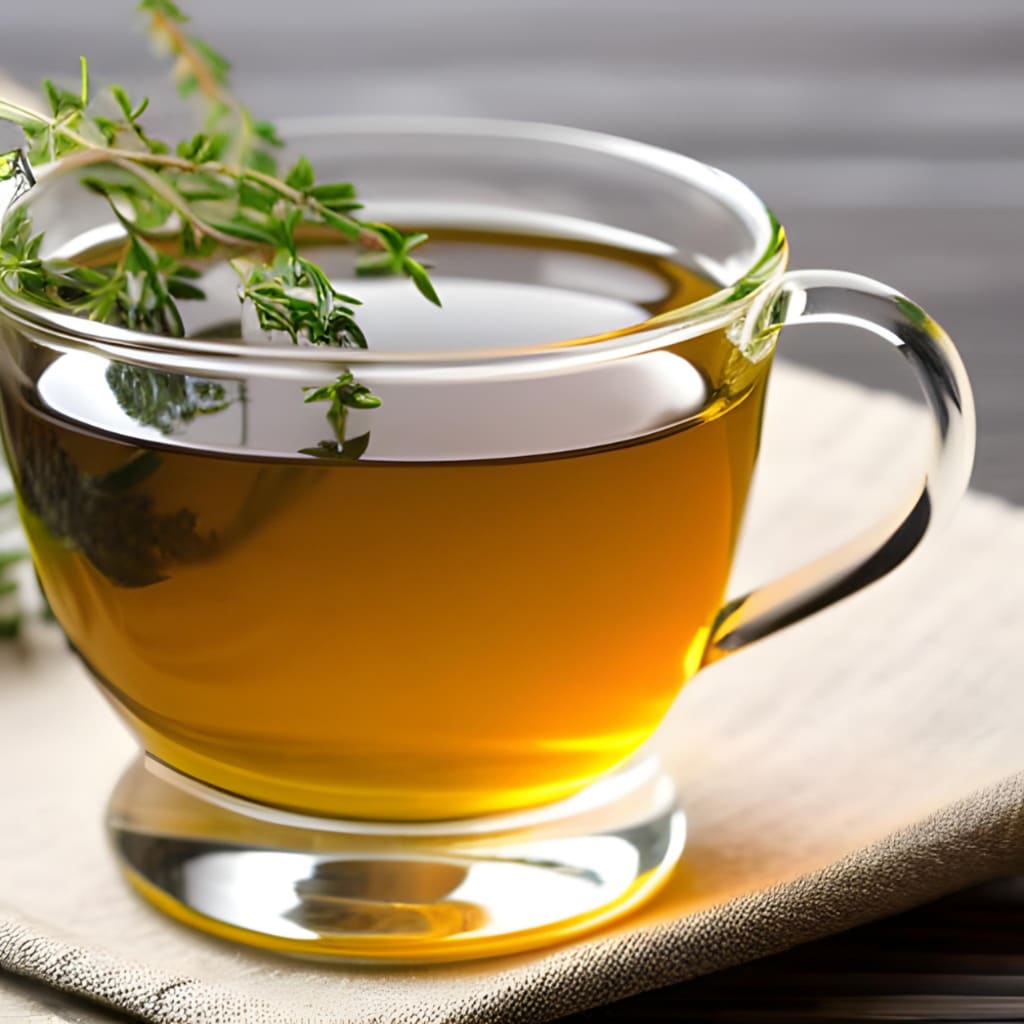Benefits of thyme tea: 7 amazing effects when consumed this way.
The benefits of thyme tea are incredibly great, which makes you want to consume it from time to time. Thyme is widely used in culinary applications due to its unique flavor and aroma when cooked. It has been a part of medicinal traditions for thousands of years, as it contains several active ingredients that make it a powerful herbal remedy, such as the active ingredient thymol, a strong antioxidant.

The benefits of thyme tea are incredibly great, which makes you want to consume it from time to time. Thyme is widely used in culinary applications due to its unique flavor and aroma when cooked. It has been a part of medicinal traditions for thousands of years, as it contains several active ingredients that make it a powerful herbal remedy, such as the active ingredient thymol, a strong antioxidant.
Thyme tea is characterized by its multiple health benefits, including relieving menstrual cramps, soothing indigestion, enhancing cognitive function, aiding sleep, preventing inflammation, boosting the immune system, and preventing chronic diseases and healing respiratory system. Thyme tea should be avoided by anyone who is allergic to plants in the mint family, Lamiaceae. It is also important to consume it in moderation, as excessive consumption of thyme tea can lead to nausea or vomiting, as well as skin rash and slowing down the heart rate. However, when consumed in moderate, natural quantities, its positive health effects should outweigh the negative effects.
How to dry thyme leaves:
You will need to dry thyme leaves before preparing tea. Cut the stems, wash them well, and dry them. Then tie them into a small bundle and hang them to dry. It will take thyme about two weeks to dry completely. Once it's dry, it will be easy to remove the dried leaves. You can then crush them into a fine tea powder or leave them whole for use in the drink.
How to make thyme tea:
Ingredients:
1 teaspoon of dried thyme leaves.
2 cups of filtered water.
1 teaspoon of honey.
1 slice of lemon.
Instructions:
Put the water in a small pot and let it boil, then reduce the heat to low.
Add the dried thyme leaves to the pot and cover it.
Let the mixture steep in the boiling water for about 5 minutes.
Then remove the pot from the heat and let it cool for 1-2 minutes.
Then strain the tea into a cup, add a slice of lemon and a teaspoon of honey to it, and enjoy your drink.
Benefits of thyme tea for the body:
Thyme tea offers amazing benefits for people who suffer from chronic diseases, respiratory infections, obesity, muscle tension, menstrual cramps, insomnia, dementia, stomach disorders, constipation, among many other things. This is due to its high levels of vitamin C, vitamin A, copper, iron, manganese, potassium, phosphorus, carvacrol, pyridoxine, and many powerful antioxidant compounds.
Thyme tea contains antioxidant properties: The active components in thyme tea have been linked to preventing or reducing many diseases, including dizziness, multiple sclerosis, tinnitus, hepatitis, shingles, and reducing total oxidative stress in the body. This is due to the antioxidants present in thyme oil, including thymol, luteolin, and others.
Thyme tea promotes respiratory health: One of the most important benefits of thyme tea is that it contains antibacterial and anti-inflammatory properties, which help to promote respiratory health and soothe coughs, remove congestion, and help you recover faster.
Thyme tea aids in weight loss: This herbal remedy is praised as the ideal tea for weight loss, as it can suppress appetite while boosting energy and providing valuable nutrients at the same time, leading to a reduction in snacking between meals. Additionally, compounds found in this tea can improve the metabolic process, which can help burn fat and promote weight loss.
Thyme tea relieves menstrual cramps: One of the benefits of thyme tea is that it is very effective in eliminating menstrual cramps due to its anti-spasmodic properties of some active compounds. This tea can also help in getting rid of pain and discomfort during menstruation, and can even regulate the menstrual cycle.
Thyme tea promotes immune system health:
The high content of vitamin C and antioxidants in thyme tea makes it an ideal boost for the immune system, helping to quickly alleviate cold and flu symptoms. Vitamin C can also stimulate the production of white blood cells, while powerful antioxidants such as thymol and apigenin help to reduce oxidative stress by neutralizing free radicals produced by the body. The antibacterial and antiseptic properties of this tea's natural compounds can also help eliminate infections and disease-causing agents.
Thyme tea improves memory:
Early research suggests that thyme tea can help improve memory, focus, and slow down the deposition of beta-amyloid in the brain. Thymol can also help increase omega-3 levels in the brain, which enhances cognitive sharpness and prevents age-related cognitive problems.
Thyme tea promotes healthy digestion:
If you are suffering from stomach upset, nausea, constipation, bloating, and cramps, thyme tea may be the optimal remedy. Its natural anti-inflammatory and soothing properties, as well as its antibacterial effects, can help eliminate stomach residue and promote healthy digestion, while normalizing bowel movements.
Side Effects of Thyme Tea:
Despite its numerous health benefits, there are some potential side effects of thyme tea that should be taken into consideration before adding this delicious drink to your health regimen.
Nausea: Drinking too much thyme tea can lead to nausea, dizziness, headache, vomiting, and stomach pain as this tea contains some highly potent chemicals and active ingredients. Therefore, there is no need to consume more than 1-2 cups per day in order to avoid these problems and enjoy its amazing benefits.
Allergy: As with any other type of herb, some people may be allergic to thyme, especially if the person is allergic to other plants in the Lamiaceae family, including rosemary, mint, and oregano. This allergy reaction can cause shortness of breath, skin rash, chest pain, and other serious symptoms. If you experience any of these symptoms, stop using thyme and seek medical care.
Pregnancy: Despite the limited research, most experts say that thyme tea should be avoided during pregnancy as it can stimulate menstruation, which may lead to early miscarriage. Similarly, breastfeeding women are also not recommended to drink this strong herbal tea without consulting a doctor.
Heart problems: Studies have shown that people with previous heart diseases may experience negative side effects if they consume excessive amounts of thyme tea.
About the Creator
chouaib achbani
Highly motivated and passionate blogger with a diverse range of interests seeking to leverage exceptional writing skills and creative mindset to engage and inspire readers.
Enjoyed the story? Support the Creator.
Subscribe for free to receive all their stories in your feed. You could also pledge your support or give them a one-off tip, letting them know you appreciate their work.






Comments
There are no comments for this story
Be the first to respond and start the conversation.